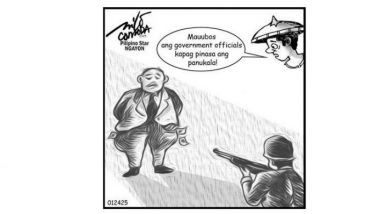Today In The Past
August 9, 2005 | 12:00am
Today, August 9, 1589, the Royal Audiencia, which was created to restrict the powers of the Governor-General and to protect the Filipinos from the abuses of the officials, is abolished.
The Royal Audiencia was the Supreme Court in the Spanish times. Created by the Royal Decree of May 15, 1583, it held its first session in Manila on June 15, 1584.
The first president of the Royal Audiencia was Governor Santiago de Vera. Owing to certain frictions between the Governor and the oidores (justices), it was abolished in 1589 only to be reestablished in 1595.
The Royal Audiencia tries all criminal and civil cases appealed to it by the lower courts. Aside from the judicial function as the highest court of the land, it performed executive and legislative functions.
As competing exploiters and oppressors, there was no lack of complaints to the king from the friars against the civil authorities. In the dispute between the two, the king sometimes was inclined to favor one and at other times the other.
The friars, however, were often as impervious to royal mandates as they were to the rulings of local officials. The king at various times ordered the examination of land titles in order to curb the land-grabbing propensities of the friars.
Such investigation had minimal effect, for some religious orders either forged land titles or simply to show evidence of ownership, claiming ecclesiastical immunity.
As early as 1578, the crown ordered the governor-general and the President of the Royal Audience to examine land titles in the Islands. Nothing, however, came of this.
The Royal Audiencia was the Supreme Court in the Spanish times. Created by the Royal Decree of May 15, 1583, it held its first session in Manila on June 15, 1584.
The first president of the Royal Audiencia was Governor Santiago de Vera. Owing to certain frictions between the Governor and the oidores (justices), it was abolished in 1589 only to be reestablished in 1595.
The Royal Audiencia tries all criminal and civil cases appealed to it by the lower courts. Aside from the judicial function as the highest court of the land, it performed executive and legislative functions.
As competing exploiters and oppressors, there was no lack of complaints to the king from the friars against the civil authorities. In the dispute between the two, the king sometimes was inclined to favor one and at other times the other.
The friars, however, were often as impervious to royal mandates as they were to the rulings of local officials. The king at various times ordered the examination of land titles in order to curb the land-grabbing propensities of the friars.
Such investigation had minimal effect, for some religious orders either forged land titles or simply to show evidence of ownership, claiming ecclesiastical immunity.
As early as 1578, the crown ordered the governor-general and the President of the Royal Audience to examine land titles in the Islands. Nothing, however, came of this.
BrandSpace Articles
<
>
- Latest
- Trending
Trending
Latest
Trending
Latest
Recommended

January 23, 2025 - 12:00am

























